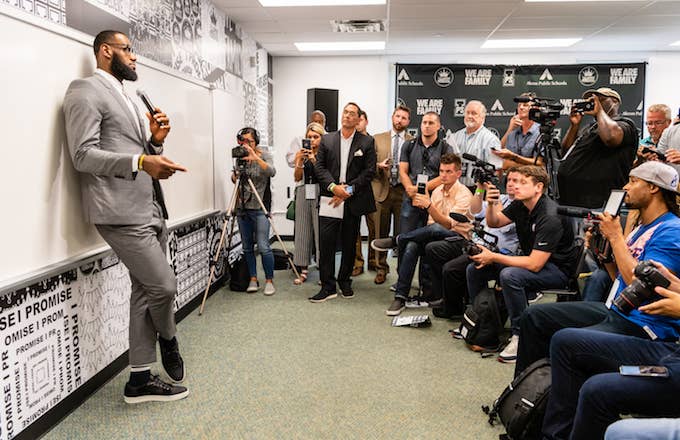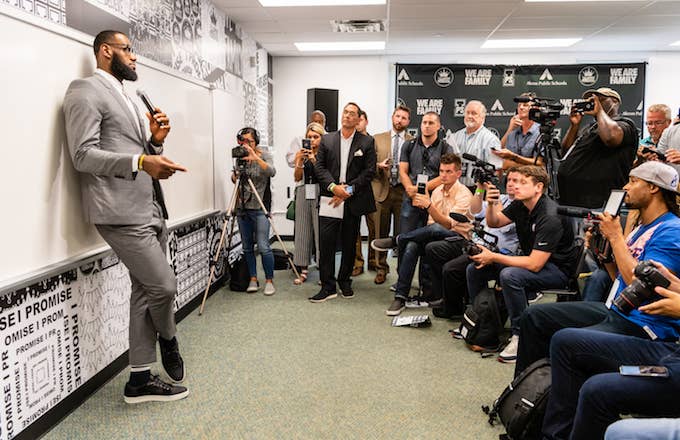
Donald Trump’s most influential opponent is not CNN or the NFL. It’s not Bernie, Booker, or Beto.
It’s LeBron James.
In the past year, the Lakers star has lambasted the president, calling Trump a “bum” and saying he doesn’t “give a fuck about the people” and is “trying to divide us.”
LeBron has fought back with philanthropy and activism. This summer, he opened the I Promise School, which provides education and support for thousands of at-risk kids in his native Akron, Ohio. He recently executive-produced three programs focused on the intersection of sports and race: Shut Up and Dribble, The Shop, and Student Athlete. He has opened his wallet, too, donating tens of millions to causes he supports.
The four-time MVP has emerged as a champion for the black community.
“In future generations, he will be known as one of the greatest basketball players to ever play,” says ESPN’s Dave McMenamin. “But when people dig beyond that—when people tell the full story, when there are documentaries and books about the full scope of the man—you won’t be able to get past the first paragraph or two without mentioning the work that he’s done in trying to lift this country out of a turbulent time.”
Today’s LeBron is not the LeBron we once knew. He has changed and will continue to change.
The question we need to start considering is: How far will LeBron take this social justice activism?
‘The Natural Evolution & Growth of a Man’
In 2007, LeBron famously avoided signing a teammate’s letter addressing the Darfur genocide. After he Euro-stepped the issue, one professor described him as “apolitical.” Others, more critically, called him selfish and ignorant.
The next year, LeBron posed for a Vogue cover that likened him to King Kong, a move that mystified critics like Jemele Hill.
Maverick Carter recently attributed LeBron’s change to “the natural evolution and growth of a man.” But when exactly did LeBron become woke?
2012: The Turning Point
LeBron first spoke out about a controversial issue after the murder of Florida teen Trayvon Martin. LeBron, who was playing for Miami at the time, recently said the incident “hit a switch” in him and “hit home” because of his sons.
“His evolution mirrors a lot of our evolution as we transition from being kids to young men, and young men into grown men, and most importantly, into looking at our lives through the prism of being fathers,” says FOX Sports’ Nick Wright.
Around the same time, LeBron transformed his foundation’s annual bike-a-thon, a one-off event at which students received a bike and backpack, into the immersive I Promise program.
“As LeBron has grown as an individual, his focus and his philanthropy have gotten deeper and deeper,” says Michele Campbell, executive director of the LeBron James Family Foundation. “Part of that is learning from his own personal experiences and part of that is also listening to the people you’re serving.”
He began to speak exponentially about political issues, particularly those pertaining to black rights. In 2014, he pushed for Clippers owner Donald Sterling to be forced from the league and wore an “I Can’t Breathe” shirt in warmups. In 2016, he delivered a Black Lives Matter monologue at the ESPYs with Chris Paul, Dwyane Wade, and Carmelo Anthony. In 2018, he speaks out constantly.
Trayvon changed LeBron. So did his accomplishments on the court.
A King’s Liberation
When LeBron took his talents to South Beach in 2010, he had not yet won an NBA title. He now has three rings, including one earned through the most epic comeback in NBA Finals history. That’ll give a guy some confidence.
“As he has become totally secure with his status and legacy as an athlete, he has taken—I don’t know if I’d say more chances, but he has become more open and honest about who he is as more than an athlete,” Wright says. “And he has not been afraid about potential backlash.”
Warriors forward Draymond Green eloquently summarized the change in James during an August episode of The Shop. Green said LeBron found himself “when he started to say, ‘Fuck y’all, I’m here.’”
His enlightenment accelerated when he first left Cleveland.
The Wake of 'The Decision'
LeBron’s move to Miami forced the league’s power dynamics to shift in favor of the players, says Yago Colás, an English professor at Oberlin College & Conservatory and author of Ball Don’t Lie: Myth, Genealogy, and Invention in the Cultures of Basketball.
“He and (Chris) Bosh and (Dwyane) Wade—but he was the biggest star in the group—took for themselves a power that had previously, unquestionably, belonged to owners and general managers, which is the power of team formation,” Colás says. “That’s a real shock to the NBA system and American pro sports system. When you consider the racial components, you’ve got three young black men basically deciding, together, who they will work for, what their company will look like, and thereby also determining the fortunes of a lot of others, instead of what we’re used to, which is white owners and white general managers doing so.”
Similarly, LeBron in 2012 rebuffed traditional representation structures, opting instead to build his own agency with three friends.
Old white guys have long held the power in American sports. LeBron has led his buddies in saying, I’ll take some of that. Not everyone likes that.
“There’s something about LeBron that is disturbing at times to white Americans, or to certain values that I associate with whiteness,” Colás says. “The more he’s asserted himself in the public eye, we’ve seen some negative reactions.”
Like, say, the reactions to “The Decision.”
LeBron has since won over some critics, but he still has plenty. One thing that’s helped him tune out the hate: he’s become focused on a legacy bigger than basketball.
Creating a ‘Snowball Effect’
The more power LeBron has taken for himself, the more he has given back to his community. He may now own that he’s King, but he hasn’t forgotten life as a peasant.
“He knows what it’s like to go to bed hungry and how hard it is to focus at school not knowing where you’re going to sleep that night,” says Campbell, the LJFF executive director.
In 2015, the LJFF partnered with the University of Akron to provide scholarships for as many as 2,300 I Promise students (valued at $41 million). James once said his foundation is “besides my family, the No. 1 thing in my life.” The foundation is his direct channel for empowering the black community.
“His broad public service is to humanize a vast segment of the American population that continues to suffer for being viewed as something other than human,” Colás says.
Like his athlete-activist predecessors, LeBron is trying to enact generational change.
“He figures, ‘If I take thousands of kids from this generation, and they have a better life because I’ve provided them with better education and shown them you can actually achieve your dreams, well, what happens when those thousands of kids start to affect the next generation?’” McMenamin says. “Eventually, we have a snowball effect, and the world’s a better place.”

LeBron has focused most directly on black kids, but he’s aiming for a universal impact.
“There is the next great innovator, athlete, scientist, or doctor in every community in America right now, and a lot of them are going to go undiscovered, unfulfilled, un-nurtured,” Wright says. “It’s our job as a society, for the betterment of all of us, to give those young people the opportunity to become their best selves. And what LeBron is doing with his school, what he’s trying to do with his commitment to social and racial justice, is not just for poor black kids. It’s for everyone, because we all benefit if one of those kids has locked in his brain the cure for cancer.”
It’s clear LeBron wants to better society. Does that mean we’ll see him run for office?
A Political Future?
Fox News host Laura Ingraham told the three-time Olympian to “shut up and dribble” in February. Ingraham was a mouthpiece for many.
“We live in a divided country,” McMenamin says. “So, just as many people who will appreciate him for speaking up, or having a political stance like opposing the president, guess what? The president still has a lot of support right now.”
When Don Lemon recently asked LeBron whether he would run for political office, he initially responded, “I don’t think so.” But, when Lemon broached the possibility that no legitimate challenger for Trump could emerge in 2020, LeBron said, “Well, in that case, I may.” He previously said he wouldn’t run because he enjoys his “me time,” but he left the door ajar.
The Lakers forward—who’s averaging 26.4 points, 7.8 rebounds and 7.1 assists per game in his 16th season—wants to play with his son. That would mean sticking around the NBA until at least 2023. McMenamin says LeBron is “probably not going to play more than four or five more years.”
LeBron almost certainly won’t run in 2020 and probably won’t in 2024, either. He’ll have plenty of demands on his time when he retires, and he’s also said he “will own a team someday.” But don’t rule out politics.
Though Wright has no inside information, he thinks it’s “certainly a possibility” that LeBron will one day run for office. He’s hoping for it.
“Because LeBron James is the embodiment and the personification of the American Dream,” Wright says. “He is someone who came from an incredibly tough background. To this day, he does not know who his father is. He bounced around multiple and very difficult housing situations as a youth. And through it all, he’s demonstrated a work ethic and commitment to righteousness...he’s changed the way people view NBA players and the way a lot of people view athletes, and maybe, at least a little bit, he’s changed the way people view young black men in this country.”
The U.S. tends to shift from one polarity to the other. If the country wants someone different from Trump, well, LeBron’s about as different as another person could be.
LeBron was long ago dubbed the Chosen One. The meaning of that moniker may change soon.

